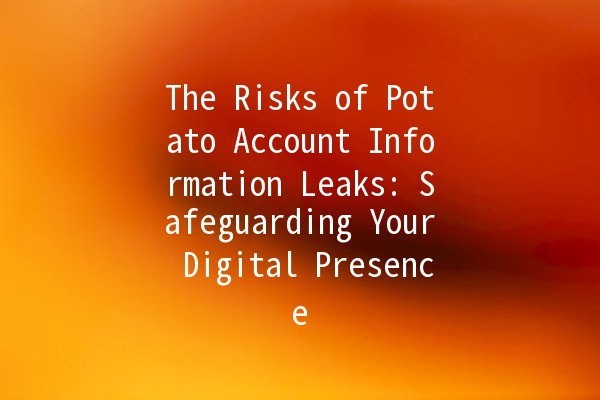In today's digital landscape, the security of online accounts has taken center stage. Various platforms offer free or subscriptionbased services, but they also come with potential risks, particularly concerning account information leaks. One service type that has garnered attention is Potato, a popular platform for users seeking fun and engaging interactions. However, as with any online service, the risks associated with information leaks are real and potentially detrimental. In this article, we will delve into the risks of Potato account information leaks and offer practical tips to help you safeguard your digital footprint. ⬇️
Understanding the Risks of Information Leaks
Information leaks can pose significant threats to individuals and organizations alike. For Potato users, these risks might include unauthorized access to personal information, identity theft, and loss of access to accounts. Here are some common consequences:

Given these potential outcomes, understanding how to mitigate these risks is essential.
Proactive Tips for Enhancing Account Security
Explanation: Weak passwords are a gateway for hackers. A strong password should be long, complex, and unique to each account.
Example: Instead of using "potato123", a stronger option would be "P0t@T0&Secure12!". Utilizing a password manager can help you generate and maintain these unique passwords without the need to remember all of them.
Explanation: 2FA adds an extra layer of security by requiring a second form of verification beyond your password.
Example: For your Potato account, you can enable 2FA through an app like Google Authenticator or by receiving SMS codes. This way, even if someone obtains your password, they would still need the second factor to access your account.
Explanation: Monitoring your account activity can help you spot unauthorized access early.
Example: Make it a habit to check your Potato account’s loggedin devices and recent activity weekly. If you notice unexpected locations or devices, change your password immediately and consider reporting the activity to Potato’s support team.
Explanation: Oversharing personal information can lead to identity theft and other security risks.
Example: Avoid posting sensitive details like your birthday, phone number, or address on your Potato profile. If you must share personal stories or experiences, ensure they do not disclose identifying information.
Explanation: Cybercriminals often use phishing attacks to trick users into revealing their login credentials or other sensitive information.
Example: Be wary of emails or messages that appear to be from Potato asking you to click on links or provide personal information. Always navigate to the Potato website directly or use their official app instead of following suspicious links.
Common Questions About Potato Account Security
If you believe your account has been breached, immediately change your password and enable twofactor authentication if it isn't already set up. Report the incident to Potato’s support team for further assistance and monitoring.
Yes, simple passwords make accounts much easier to hack. Cybercriminals can use automated tools to rapidly test numerous password combinations. Strong, complex passwords significantly lower this risk.
As a general rule, it’s good practice to change passwords every three to six months, especially when associated with sensitive accounts. If you suspect a breach, change your password immediately.
While 2FA significantly increases your account security, it is not entirely foolproof. Highly sophisticated attackers can sometimes bypass 2FA through tactics like SIM swapping. However, using 2FA is still one of the best methods to enhance your security.
Phishing attempts often come in the form of officiallooking emails or messages that contain links or requests for personal information. Signs include odd sender email addresses, poor grammar, and a sense of urgency to act quickly. Always verify the source before clicking any link.
If you discover that your information has been leaked, you should immediately take steps to secure your accounts, such as changing passwords and enabling twofactor authentication. Additionally, keep a close eye on your financial statements for any unauthorized activity.
Proactive Strategies for Enhancing Online Security
When it comes to securing your Potato account and other online services, adopting a proactive approach is crucial. Here are additional strategies to bolster your security measures:
Keep your devices and applications updated regularly to ensure you have the latest security patches. Often, security breaches occur because users overlook these vital updates.
Invest in reputable antivirus and firewall software to protect against malware, trojans, and other cyber threats that could compromise your accounts.
Be cautious when linking your Potato account with thirdparty apps. While integrating services can enhance your experience, it can also expose your data to vulnerabilities.
Share your knowledge about security best practices with friends and family. A wellinformed circle can help reduce the overall risks of online threats.
Practice mindfulness before opening links or attachments. If it seems suspicious, consider it a potential threat until proven otherwise.
By understanding the risks associated with Potato account information leaks and taking proactive measures to secure your account, you can enjoy the benefits of this platform without compromising your personal security. Stay safe online!